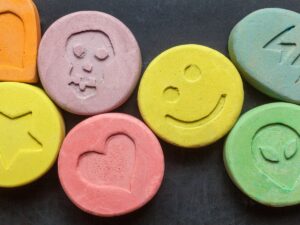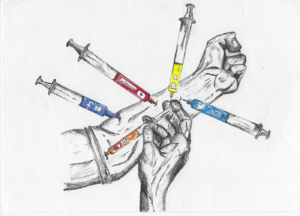Most people, when asked can recall at least a few memorable events when they took their drinking too far. But after a few “I’m never drinking again” level hangovers, most people return to drinking in moderation, at least most of the time. So, why is it harder for others to walk this fine line?
The truth is, the signs of alcohol and other drug dependence can be difficult to identity, more than likely because it is hard for us to accept when we’ve lost control.
Going through the motions of an alcohol addiction can start to feel very much like stages of grief, where so much time is spent denying the problem. Attacking the ones who are trying to help and bargaining with ourselves over a few “insignificant” drinks before ending up back where we started.
If any of this sounds familiar, read on to learn about the signs of alcohol and other drug dependence.
Signs of Alcohol Addiction and its Dependance:
You are Drinking Frequently or Heavily
There are several patterns of unhealthy drinking that may indicate alcoholism. The first of which is binge drinking, also known as heavy episodic drinking.
The National Institute on Alcohol Abuse and Alcoholism (NIAA) defines binge drinking as consuming five or more standard drinks in one hour for men or four or more drinks for females.1 In other words, binge drinking can be defined as drinking a large number of drinks over a short period of time.
The other, heavy drinking, is defined as drinking more than four drinks daily or fourteen drinks a week for men and seven drinks a week for women.1
While binge drinking or heavy drinking does not always mean alcohol addiction, engaging in behaviors along with these and getting black out drunk or drinking until you pass out are strong indicators. Another criterion for alcoholism, is continuing to use alcohol despite social and legal repercussions (i.e. loss of job, DUI, and serious health issues).
Also Read: How to deal with depression and anxiety
Friends and Family are Concerned About Your Drinking
People often notice things about us that we miss about ourselves. Not everyone will risk their relationship to confront a friend or loved one about a drug or alcohol problem, but when it’s people that you love and trust, it is time to start paying attention.
If your drinking has reached the point where it is causing harm to others, you may also find yourself being the subject of an intervention with multiple friends and family at once.
You Often Drink More Than You Mean To
How many times have you said, “I’ll just have just a few drinks” and ended up binge drinking anyways? Not being able to moderate your drinking is a strong indicator of waning self-control–a problem associated with alcohol addiction.2
You Are Engaging in Dangerous or Unlawful Behaviors
It’s no secret that heavy alcohol consumption can result in poor life choices. From DUI’s, infidelity or causing injury to yourself or others, alcohol can result in some pretty life changing consequences.
Normally, these events are a wakeup call, but if a person refuses to get their drinking under control despite repeated negative consequences, this could be a tell-tale sign of alcoholism.
You Feel Terrible When You Aren’t Drinking
As anybody who has spent a night out of heavy drinking can tell you, the morning after hangover can make you regret ever drinking. Heavy drinkers, however, spend a lot of time dealing with the negative health effects of overindulging.
Some of the effects that heavy drinkers and alcoholics regularly experience include3
- Stomach pain and nausea
- irritability
- headaches
- Low energy
- Haziness and difficulty concentrating
- Weakened immune system
- Numbness of limbs
- Memory loss
- Withdrawals (when not drinking)
You Have underlying Mental Health Issues
If you have one or more diagnosed mental health disorders and are abusing alcohol or other drugs, the risk for developing substance use disorder (SUD) is higher. According to the American Medical Association, approximately 50% of those with severe mental disorders also have substance abuse issues.4
The reason for this varies but using alcohol as a substitution for treatment is common. For example, a person might drink when they are feeling depressed or anxious so that they can take the edge off.4
When people lean on substances in this way, sobriety can become unpleasant, making it more likely that the person will spend more of their time drinking.
Alcoholism Runs in Your Family
Research indicates that genetics account for 40-60 percent of a person’s addiction risk. Given this fact, if you are addicted to alcohol, it’s possible that your addiction didn’t start with you.
Addiction is similar to other inheritable diseases with treatment outcomes similar to diabetes.5
Rehab Center for Alcohol Addiction
When the signs of alcohol and other drug dependance becomes obvious, the next step is to look for addiction treatment.
Alcohol dependency can be dangerous and often requires medical detox, just to be on the safe side. People who attend inpatient alcohol rehab have better access to relapse prevention, medical support, lifesaving medications, and mental health services like individual therapy and peer support.
All American Detox Center, center is a rehab center in California that provides inpatient rehabilitation and detox services for those seeking treatment for alcohol addiction and other substances. For more information about our quality service and facilities. Call us today at (844) 570-1301.
Conclusion
It is not always easy to accept when an alcohol problem has become an addiction, but when it has, there are several signs that serve as indicators. People who are falling into alcoholism begin to drink more and binge heavily. They also tend to lack the ability to stop drinking once they’ve started.
This may also be an indicator that alcoholism runs in your family or stems from a preexisting mental health issue as well. As a result of heavy and frequent drinking, alcoholics may do things that cause danger to themselves or others and risk life altering consequences if they continue to use.
Citations
U.S. Department of Health and Human Services. (n.d.). Drinking levels defined. National Institute on Alcohol Abuse and Alcoholism. Retrieved August 22, 2022, from https://www.niaaa.nih.gov/alcohol-health/overview-alcohol-consumption/moderate-binge-drinking
Verywell Mind. (2021, July 8). Types of drinking habits to avoid. Verywell Mind. Retrieved August 22, 2022, from https://www.verywellmind.com/what-are-the-different-types-of-alcohol-problems-63139
Mayo Foundation for Medical Education and Research. (2022, May 18). Alcohol use disorder. Mayo Clinic. Retrieved August 22, 2022, from https://www.mayoclinic.org/diseases-conditions/alcohol-use-disorder/symptoms-causes/syc-20369243
Robinson, L., Smith, M., & Segal, J. (2022, August 18). Dual diagnosis: Substance abuse and mental health. HelpGuide.org. Retrieved August 22, 2022, from https://www.helpguide.org/articles/addictions/substance-abuse-and-mental-health.htm
Retooling our comparisons of addiction to other illnesses. Recovery Research Institute. (2020, July 3). Retrieved August 22, 2022, from https://www.recoveryanswers.org/research-post/addiction-treatment-policy-expert-suggests-comparisons-addiction-illness-may-need-retooled/






